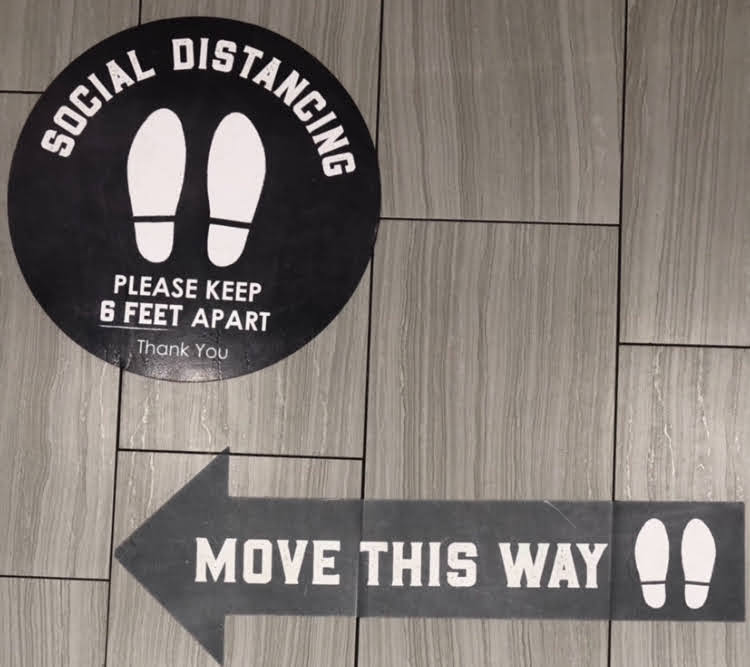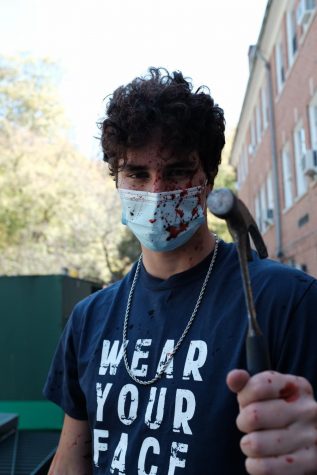As the Fall 2020 semester comes to a close, students and professors reflect on their experiences
As the Fall 2020 semester- the first on-campus semester to feel the effects of COVID-19- winds down, students and professors reflect on how it altered their experiences.
Years from now, the Fall 2020 semester will be one for the history books. It was the first full, on-campus semester impacted by the COVID-19 pandemic. Pace had to implement numerous changes to the way it runs for the sake of student and staff safety, and these changes altered the college experience for students and professors alike.
“This semester has been different in almost every regard for me,” says senior accounting major Ryan Sultan. “While I do enjoy my online communities and my in-person communities, I do not appreciate one trying to become the other.”
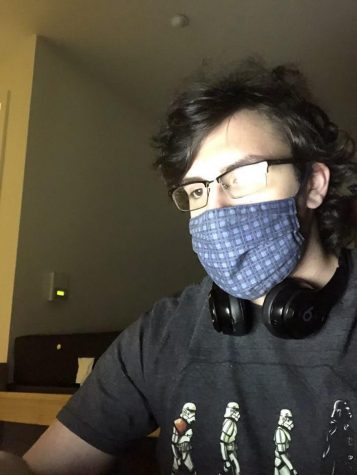
Sultan expressed frustration at the fact that classes and social interactions that he typically enjoys having in-person took place almost entirely on his computer. He also found that Zoom classes were more difficult and less engaging due to technical difficulties and a lack of personal connection. He was not alone in this sentiment. Sophomore nursing major Laura Knecht says that she experienced “Zoom fatigue.”
“All the activities that I am involved in mostly took place online, which definitely wasn’t the same, but at a time like this it was necessary, and it was the best that we could do,” Knecht says.
Sophomore DCF major Diego Mallens says that, since his major is grounded in hands-on learning, online classes were a major setback.
“I came to campus expecting to have one or two classes in person, but my professors for the most part ended up having classes online exclusively,” Mallens says. “The work I usually do is hands on… now we can only focus on the planning portion of filmmaking. ”
Mallens also noted that this has virtual world has provided difficulties in engaging in activities related to his passion.
“I love going to movies in theaters to the point where it’s a weekly tradition for me, but now movies aren’t coming out and I have to drive out of state to even see a movie. This is a curse and a blessing, as its edged me into looking for some new hobbies,” he stated.
Mallens had hoped that, by the end of the semester, the prevalence of the virus would have decreased and that the school would be able to loosen its restrictions. However, that was not the case. Knecht and Sultan, on the other hand, say that things were not as bad as they expected.
“Going into this semester, I expected that there were going to be these precautions and rules in place,” Knecht says. “I was happy that my sorority was able to have a couple of recruitment events in person at a safe distance with masks on. This allowed us to meet potential new members in person and really get to know them. I also did not think that I would be able to have sim lab for nursing in person every week, which was very crucial for us to learn basic hands on nursing skills.”
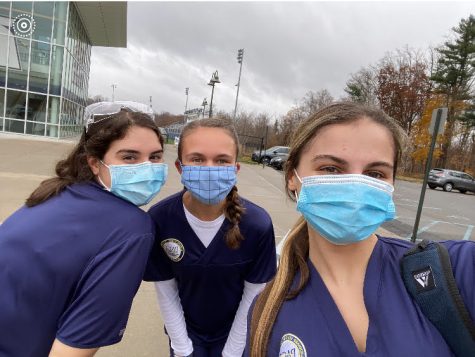
Sultan moved to campus after his friends and expected things to be much stricter based on the descriptions they gave him while he was still home. When he arrived on campus, he saw that things were not as bad as others had made it out to be. However, he says that while things are better than he expected them to be, they are far from perfect. He misses being able to hang out with his friends in their dorms and in communal spaces in Kessel, like the honors lounge.
Knecht and Mallens also say that, even though they understand why the precautions are needed, they miss being able to hang out with their friends in their dorms, especially if those friends live in other buildings. Mallens says that he has grown distant with some of his friends in other buildings.
Knecht says that she also misses her normal schedule and in-person classes, and Mallens misses the traveling food stations in Kessel.
Since Mallens lives in Alumni, he was part of the two-week quarantine that took place there at the end of September. He names that as his most “uniquely 2020” experience.
“I never thought I would be in a situation like that where I was locked in for 2 weeks, and it felt like an eternity,” Mallens said. “Although I did not like the Alumni Quarantine, I am happy they did it. It was a quick and efficient response to the spike on campus. My only complaint was the food as there weren’t many options and the options were not very good.”
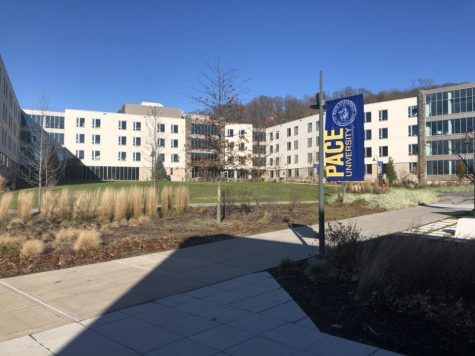
Knecht says that her “uniquely 2020” memory was seeing people in masks everywhere.
“I have met people for the first time without knowing exactly what they look like, as I only was able to see half of their face,” Knecht says.
Sultan says that during summer break and throughout the semester, he played more online games with his friends, even though some of them do not typically play online games.
“If you were to tell me a year ago that some of my friends would all be playing games online, I would hardly believe you,” Sultan says. “Granted, the games exploded in popularity due to the virus and various other reasons, but the whole premise just would be outlandish if this had been any other year. I have the virus to thank.”
Sultan notes his housing situation another silver lining of the virus. As someone who enjoys space and privacy, he has enjoyed having a room to himself after his roommate opted out of dorming this past semester.
On the opposite end of the spectrum, Knecht says that she enjoyed being able to spend more time with the people she shared her townhouse with. They formed stronger bonds, and they did homework and classes together, which kept everyone motivated.
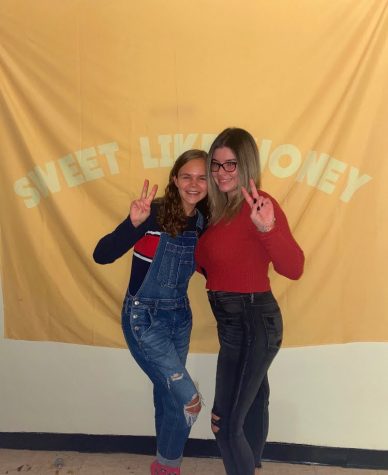
Mallens stated that, for him, the silver lining to all the changes was that people were less likely to get COVID.
Professors also felt the effects of the pandemic precautions on the way they taught their classes this semester.
“This semester has been different because I enjoy interacting with the students on a personal level,” says Kevin Czerwinski, an adjunct professor in Pace’s MCVA department. “I believe that part of being a good teacher is knowing who you are teaching and from that standpoint, getting to know the students on a zoom call or in a ridiculous asynchronous setting is difficult.”
Czerwinski says that, when he taught film classes in person, he had students who would come early or stay late to talk. He has had a few students who have stayed on Zoom calls after class is done, but he still misses in person interactions.
“As for the public speaking classes I teach, I am limited because to truly be able to help the students you need to be in the same room, watch how they stand, note their posture,” Czerwinski says. “You don’t get any of that on a zoom call or through an asynchronous setting. What’s the point in that?”
Michelle Land, a professor in Dyson’s Institute for Sustainability and Environment, agrees with Czerwinski’s sentiments about the pandemic’s impact on the sense of connection and community in the classroom.
“Masks, social distancing, and Zoom stations are essential during these days of COVID, but they also create barriers to establishing a rapport between faculty and students,” Land says. “I miss the energy of a full classroom and the opportunity to connect with a student who drops by office hours just to chat.”
Louis Guarneri, another professor in the MCVA department, has experienced the effects of the pandemic in his film production classes.
“While the spirit remains the same- we create media rain, sleet, snow or pandemic- the way we run the show is a little different,” Guarneri says. “We had to change the classrooms around, we had to change the way we give out equipment. There’s a much larger emphasis on cleaning equipment, and workstations. Every part of the day is different now. From starting up the zoom to be concurrent with our in-person students, to the way we organize and clean the spaces after everyone leaves. Outside of the classroom, I am extremely involved with local music. So not being able to go to shows, not being able to enjoy live music, and most importantly not being able to see my friends hasn’t been awesome.”
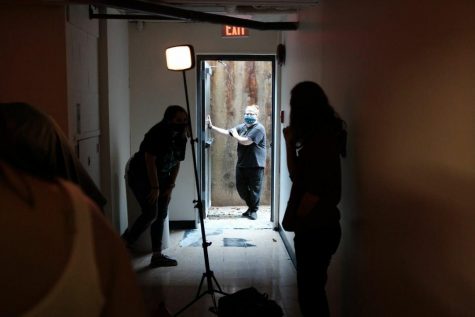
Guarneri says that it has been difficult losing a large portion of the editing spaces that his students normally use. He has seen great work done in those spaces, and as someone who does a lot of his own editing, he knows how important it is to have somewhere where you can concentrate, turn up the volume, and get “in the zone”.
“Losing the dedicated editing space for the documentary team was sad too,” Guarneri says. “I was so used to students ‘living’ in that room. Seeing it as a storage closest is just profoundly sad to me.”
Last spring, Pace’s documentary class was supposed to go to France to film, but that trip had to be cancelled. While Guarneri wishes that they could have gone, he is grateful to have had the opportunity to be on campus again this semester.
“In a way, I think the changes Pace had to make really gave many of us on campus a new appreciation for the space, and for being able to push forward regardless of the situation,” Guarneri says. “I found many students were really happy just to be there and be able to create. In a weird way, I feel like our class productions became the escape from the outside world. I know it did for me, anyway.”
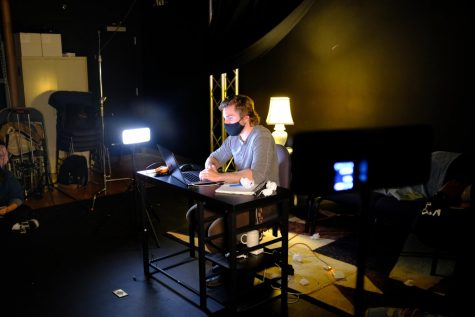
Both Guarneri and Czerwinski say that this semester has gone better than they expected.
“I didn’t expect some classes to turn out as well as they did,” Czerwinski says. “I had students who actually asked to have class time rather than working on their own because they felt they would benefit more from the structure and from being in class. I appreciate and respect that approach.”
Czerwinski says that he is grateful that, so far, he and all of his students have remained healthy and safe.
Guarneri admits that he did not expect on-campus classes to last as long as they did. Even though Pace switched to fully online operations in the last week, Guarneri still appreciates the time that his classes did get.
“While it’s a bummer that we didn’t finish out the entire semester, it’s also important to celebrate the fact that we made it as far as we did,” Guarneri says. “I can’t speak for everyone on campus, but I can tell you for sure my students were able to work on amazing projects, and really that’s all that matters to me.”
He recounts an incident in which a student showed up to class in a full Peppa Pig costume and says that that moment speaks to the fact that, even in the midst of a pandemic, the MCVA department remains an “awesome, close-knit film community.”
Land believes that, while this semester presented it’s fair share of challenges, it also presented many opportunities for growth. She says that she is pleased with the increase in tolerance and compassion that COVID brought out in her colleagues, and thinks that the increase in virtual meetings- possibly even after COVID has passed- will lead to a needed decrease in travel-related carbon emissions.
So where will Pace go from here?
Mallens and Czerwinski hope that, with reports of a possible vaccine emerging, there could be a chance of returning to normal, or at least closer to normal.
“I don’t think the students benefit or learn as much from this type of learning,” Czerwinski says. “I have children of my own – one in high school and one in college – and I see how ineffective it can be from the other side.”
Ideally, Sultan hopes that things can go back to the way they were pre-COVID, but he thinks that that might be a long shot. Realistically, he hopes that restrictions can be dialed back at the very least.
Sultan believes that the increase in security, the rapid responses of contact tracing, and all the quarantine accommodations were good moves on Pace’s part. However, he does believe that rules relying on voluntary compliance- such as Pace Safe Assessments and signing into lounges and other communal facilities- leave too much wiggle room, especially since some students take the virus more seriously than others.
“In an ideal world, this would be done, and we would have rainbows and ice cream and the plague would have left in a month, but we are Human College Students,” Sultan says. “Some people were breaking many Pace rules prior to the pandemic and the application of more rules and restrictions wouldn’t change that.”
Knecht hopes that cases can be more controlled in the spring so that students can spend more time with their friends, visit dorms and houses, and have more in person events. She believes that Pace did a good job of monitoring and controlling the spread of COVID-19 this semester, but she wishes that weekly testing were mandatory for every student. She believes that that would provide a more accurate picture of positive cases on campus.
Guarneri hopes that his classes can continue to make films next semester. He anticipates that they will still have to follow the restrictions that they do now, but says that if it was done this semester, it can be done again.
Guarneri believes that Pace made the right decision quarantining Alumni when cases were rising in an effort to contain the spread. However, he would like to see Pace improve their communication and transparency and hopes that they will analyze what worked and what did not this past semester when laying out restrictions for next.
“I really do want to emphasize how proud I am of my students for coming in under these circumstances, and still putting 150 million percent into their craft,” Guarneri says. “It’s truly inspiring to see that nothing will stop their creative process.”
Land would like to see Pace go back to its pre-COVID, fully in-person procedures in the spring, but she expects that things will be more like this past fall semester, with ongoing refinements and adaptations as needed. She believes that Pace has done a good job of keeping COVID to a minimum on campus.
“For some, the year 2020 will be forever tied to thoughts of pandemic-related sacrifices and losses,” Land says. “However, I hope the memories of the 2020 pandemic that prevail are associated with our resilience, creativity, and renewed emphasis on caring for one another.”
Your donation supports independent, student-run journalism at Pace University. Support the Pace Chronicle to help cover publishing costs.

